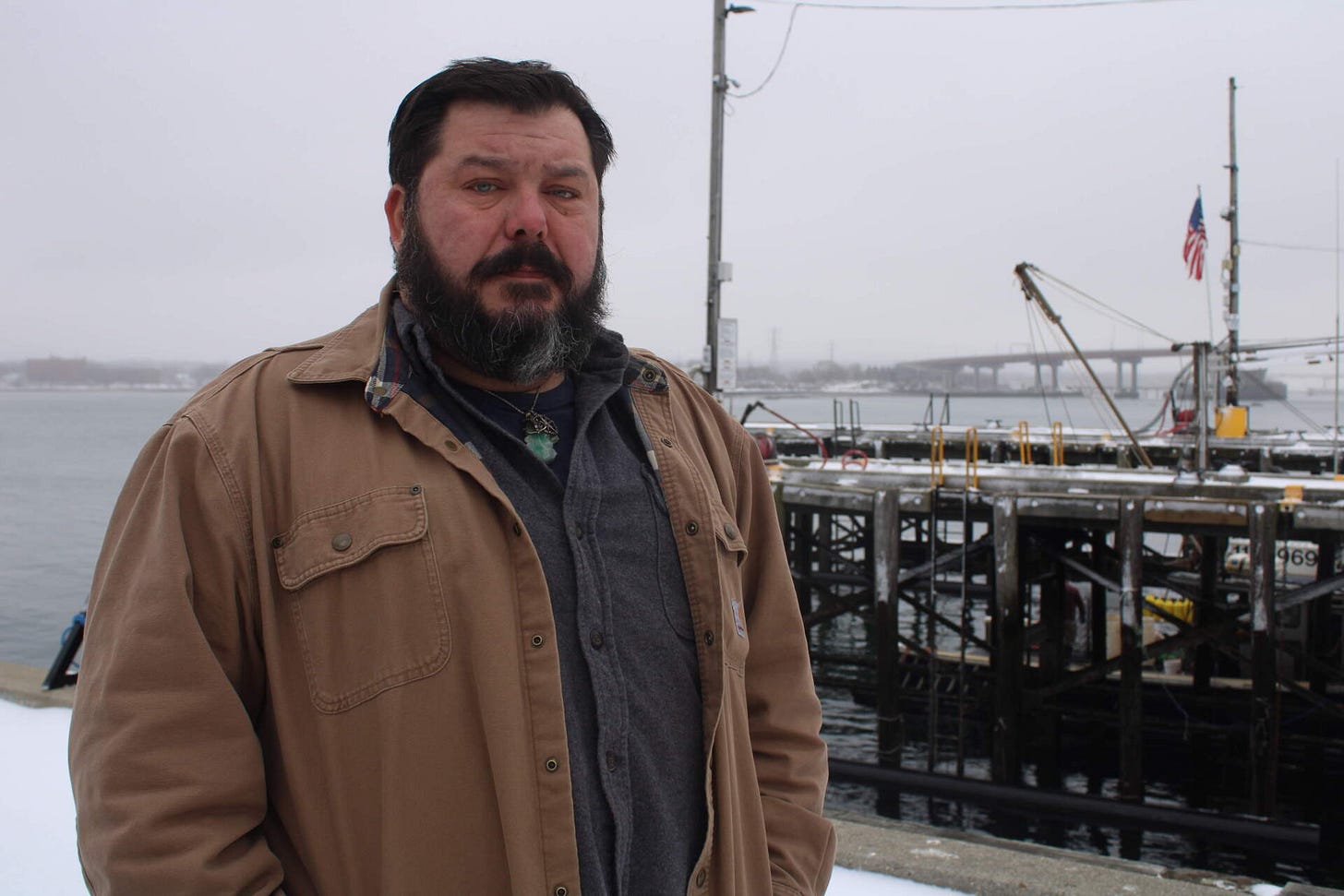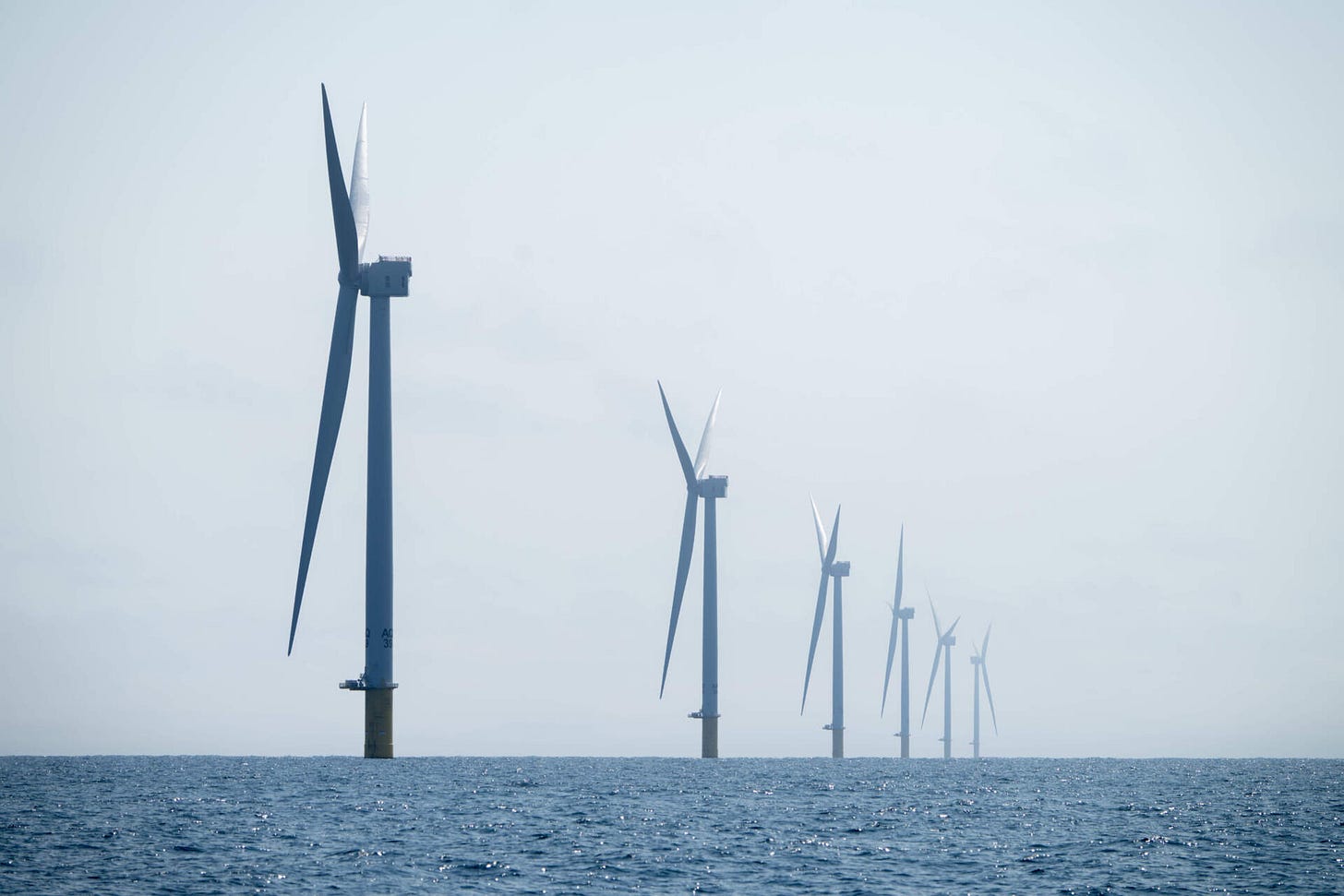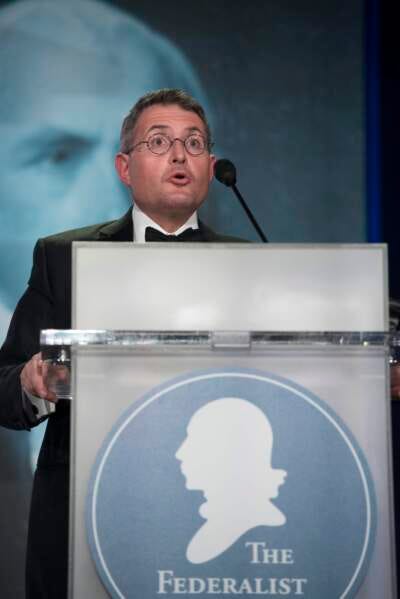With Leonard Leo backing, New England offshore wind opponents gain strength
Owner of Nor'Easter Lobster Pound is Leo acolyte
NORTHEAST HARBOR, April 23, 2025 - Leonard Leo, the dark angel who sprinkles cash here beyond his political activity on the national stage, is quietly influencing local politics in Maine, as reported by WBUR and Maine Public.
Here is the first article by Mariam Wasser for WBUR Radio in Boston on Dec. 20, 2024. The QSJ received full permission to republish the article:
Jerry Leeman III is a fifth generation Maine fisherman and looks the part: broad shoulders, muscular hands, scraggly black beard with streaks of gray. Sitting at the head of an empty boardroom table in his South Portland office, he rails against the buildout of offshore wind currently getting underway in the Northeast.
Leeman has read the government’s environmental assessments and he’s heard scientific experts say turbines won’t destroy the marine ecosystem — but he doesn’t trust them.
“So you’re going to tell me somebody fresh out of college that got a degree knows more about your region and your fishery than [fishermen] who have spent 40 years [on the water]?” he says. “Who is the expert?”
Plenty of fishermen in the Northeast feel they're being squeezed out of existence by federal regulations and offshore wind development. But Leeman has a bigger platform than most. He founded and now leads the New England Fishermen’s Stewardship Association, better known as NEFSA.
Since forming in early 2023, the nonprofit has become a rising star in the offshore wind opposition movement. In a matter of months, the group seemed to be everywhere — from Facebook to Fox News to federal meetings — making claims about offshore wind that marine scientists and wind energy experts say are misleading or flat out wrong.
NEFSA’s anti-wind, anti-government regulation message resonates with many in the fishing community. But the scrappy group has also been turbocharged by the $1.1 million it received from a nonprofit linked to Leonard Leo, the conservative powerhouse and co-chairman of the Federalist Society.
Leo is perhaps best known for giving then-candidate Donald Trump a list of potential Supreme Court justices in 2016, though his activism for conservative causes extends far beyond that; he recently said in an NPR interview that, after decades of successfully working to shift the country’s courts to the right, he’s now on a mission to “crush liberal dominance” in other spheres of American life.
Leeman and other leaders at NEFSA say the nonprofit acts independently of its funders. But its affiliation with Leo places it within a growing network of anti-offshore wind organizations aided by conservative groups, many of which are known for casting doubt on climate science.
"It's a six-alarm fire to see [Leo] involved in offshore wind,” says Charlie Spatz, an analyst with the Energy and Policy Institute, an energy watchdog group. “He has unlimited money and ruthless teams that will use anything to push their agenda."

Fishermen in New England face significant challenges, and the plight of their industry is a real problem for the families they support and the economies of many coastal communities. But as 2024 comes to a close, Leeman and other leaders at NEFSA feel optimistic — both about the group’s meteoric rise and the incoming Trump administration, which shares their hostility to offshore wind.
Environmentalists, however, worry that with such a big platform, a group like NEFSA could help derail the young offshore wind industry, undermining the ability of Northeast states to curb planet-warming emissions and produce enough electricity to keep the lights on in the coming decades.
Among the threats New England fishermen face is climate change. Ocean temperatures are rising. That’s causing species that need cooler water, such as lobster and cod, to travel farther north or deeper into the sea. Renewable energy sources, like offshore wind, would help rein in the pollution that’s warming the planet.
But Leeman doesn’t accept the science around climate change — or at least, he’s not so sure it's behind ocean warming.
“I’m not a denier and I’m not an acceptor,” he says. “What’s going on with our waters? It could be a plethora of issues.”
Before he founded NEFSA, Leeman became famous in the New England fishing community for posting Facebook videos critical of the federal fishery surveys that help determine catch quotas and other restrictions.
In one, he stands on his boat and points to a map of the Gulf of Maine. Though scientists purposefully sample fish from select areas and use that to estimate the population size, Leeman thinks the method is flawed because the results don’t line up with what he sees out on the water.
“They are not doing right by any fishermen or lobstermen,” he wrote in the caption. “They are only pushing their narrative to push us out of the way for wind mills.”
The video has 16,000 views.
Leeman's videos resonate with a lot of fishermen who share his frustration with scientists and fear that offshore wind will displace them from popular fishing grounds, says Dustin Delano, a lobsterman and NEFSA’s chief operating officer.
“Offshore wind doesn’t discriminate by gear type and fishery,” says Delano, who sold his boat and traps last year to work with Leeman. “We’re all going to be in serious trouble if our areas that we depend on are industrialized.”

After seeing the response to his online videos, Leeman decided to start a nonprofit to unite fishermen in what he describes as their shared fight to preserve generational knowledge and safeguard their heritage. He brought in a few friends, and they incorporated in 2023.
One of those friends was Ronnie Musetti, a young lobsterman who currently serves as NEFSA’s part-time treasurer. Musetti co-owns a seafood restaurant in the picturesque seaside village of Northeast Harbor, near Acadia National Park.
The restaurant, The Nor’easter, attracts a diverse clientele, he says. “There are fishermen at the bar, but then you could roll in and see Martha Stewart in the dining room.”
Leo, who owns a $3.3 million home in the town, is one of those high-profile regulars.
Musetti says he often chatted with Leo when he came in to eat, and over time the two became friendly, bonding over their shared frustrations with certain government regulations. One day, the young lobsterman decided to ask Leo for help with NEFSA.
“I actually texted him,” Musetti says, “not really knowing if I was even going to get a response [or if] it would be something he was interested in.”
As it turns out, Leo was interested. He invited Musetti and Leeman to his home in Northeast Harbor to discuss the details, and a little while later, NEFSA got a $573,000 donation.
The money didn't come directly from Leo; it came from The Concord Fund, an organization — formerly called the Judicial Crisis Network — that's part of a sprawling network of nonprofits and foundations connected to Leo. These groups have taken in millions of dollars from anonymous donors and doled the money out to other organizations, effectively creating what Spatz of the Energy and Policy Institute calls "a slush-fund for billionaires to push their interests."
Federal tax documents from 2023, the most recent year available, show that The Concord Fund donated more than $44 million to 46 organizations, including anti-abortion groups like Susan B. Anthony Pro-Life America; Do No Harm, a group for medical professionals who oppose diversity and equity initiatives; and the Faith and Freedom Coalition, a conservative Christian advocacy group. The fund also gave money to groups that have downplayed climate change and promoted fossil fuels, like the American Legislative Exchange Council and a nonprofit affiliated with the Heartland Institute.
The Concord Fund’s donation made up about 80% of NEFSA’s funding in 2023, tax documents show. NEFSA received another $573,000 gift from The Concord Fund this year, according to Delano, and he expects a third and final installment in 2025.
The money has been a game changer for the group and its officers. It allowed them to move their headquarters out of Leeman’s father’s garage and into an office in South Portland. It enabled them to pay Leeman and Delano $100,000 salaries. And it gave them cash to promote their nonprofit and travel to fishing management meetings across the region.
“We’ve been very fortunate to have the help we’ve had,” Delano says — even if that support courts controversy.
“I don’t have any hesitation with that whatsoever because our fisheries are in a place now where, if we don’t fight like hell, we’re not going to have anything left,” he says. “But what I do have a problem with is anyone coming to the conclusion that NEFSA was created to be essentially a puppet for some kind of agenda.”
Leo declined an interview request, but in an emailed statement called it “a privilege" to help NEFSA.
“The fishermen and their businesses are cornerstones of the New England communities and are an essential part of their identity and heritage,” Leo wrote. “How could one not support them in their struggle against out of touch regulators and developers that are shutting down their family businesses and the lifeblood of many communities?”
While Leo has no role in the group’s day-to-day operations, being connected to him comes with perks, like free use of CRC Advisors, Leo’s for-profit public relations company, and access to the high-end law firm Holtzman Vogel, which does work for other Leo-affiliated groups like the Marble Freedom Trust and the Rule of Law Trust.
There’s nothing unusual about a nonprofit accepting money and assistance from a rich benefactor; plenty of environmental groups receive funding from liberal nonprofits and wealthy people. But several scientists and environmentalists worry the money from Leo’s network is being used to amplify false or misleading information about offshore wind.
Since quitting his job as a commercial fisherman to run NEFSA, Leeman says he’s spent a lot of time reading scientific papers to understand how offshore wind might affect the ocean ecosystem.
“Over the last year and a half, I spent probably two months just locked to three computers, just going through every piece of research we could find,” he says. Every study he read led to more questions.
“I go, 'This isn’t good. We have no answers,' ” he says.
Chris Rillihan, a scientist at UMass Dartmouth’s School for Marine Science and Technology, says he hears this all the time from fishermen.
Scientists can't know everything about the ocean, he says, but they know quite a bit — enough to say “it seems as if there’s not going to be any catastrophic effects” on the ocean from offshore wind development.
Rillihan says he has a lot of sympathy for fishermen because life has gotten harder for them in the last few decades and offshore wind could change how some operate. But climate change is also a big threat, and the Gulf of Maine, which extends from the southern tip of Nova Scotia to the outer Cape, is one of the fastest-warming bodies of water in the world. Already several commercial species have shifted their habitat in response.
“I think there's a misperception that if we don't do [offshore wind], everything will remain the same,” he adds. But right now in New England, “the alternative to not building offshore wind is to continue relying on fossil fuels. And we know that that is impacting a lot of these species as well.”
After doing his own research into the potential effects of offshore wind development, Leeman compiled his findings into two documents published on NEFSA’s website.
Barbara Sullivan Watts, senior marine research scientist and professor emeritus at the University of Rhode Island Graduate School of Oceanography, was one of several scientists who looked at the documents for WBUR. While the reports cite scientific studies published in reputable journals, she says it seems Leeman did a bit of “cherry picking” to draw his conclusions.
For example, one of Leeman's reports suggests that electromagnetic fields from subsea cables that carry electricity from wind farms to shore could harm lobsters. He cites a peer-reviewed study showing that egg-bearing lobsters placed in cages above electrical wires had offspring that didn’t grow as big and couldn’t swim as well as those in the control group.
That may be the outcome in a controlled experiment, Sullivan Watts says, but in the real world the effect is limited because the cables will only cover a tiny portion of the ocean floor, and the animals move around. She also points out that there are already a lot of electrical cables buried beneath the ocean floor.
In another instance, scientific experts say Leeman makes misleading statements about the “wind wake effect,” a phenomenon in which ocean surface temperatures in a localized area downwind from turbines rises slightly under certain weather conditions. Leeman claims that because of the effect, “wind farms mimic climate change by causing sea surface temperatures to rise.” Researchers say the actual impact is minimal and unlikely to have any meaningful effect on ocean dynamics.
“Nobody is saying there’s no impact from offshore wind,” Sullivan Watts says. But “what one has to keep in mind is the scale of the impacts.”
NEFSA also posts news stories on its social media accounts that suggest offshore wind development is connected to an unusual number of whale strandings and deaths along the East Coast. In reality, “vessel strikes and entanglement in fishing gear are the greatest human threats to large whales,” according to the federal government.
Between the cherry-picked conclusions described in Leeman’s reports and other misleading information NEFSA has shared on social media, the group appears to be following well-known patterns of misinformation, says Lisa Graves, who studies how right wing groups influence U.S. policy and institutions for the progressive firm True North Research.
“The core tactic is to sow doubt about the science and to try to present ‘alternative science’ that is not consistent with the majority of scientific opinion,” she says.
On the morning of Nov. 6, just hours after Donald Trump declared victory in the 2024 presidential election, NEFSA blasted out a press release.
“Commercial fishermen have high hopes for new Trump administration,” read the headline.
Many New England fishermen voted for Trump this November, attracted to him in large part because of his antipathy toward offshore wind and the promise he made on the campaign trail to "end" the industry "on day one."
Groups like NEFSA “are going to be in a better position under Trump,” says Graves. “And their efforts to block or stop or delay offshore wind may prove to be successful.”
Leaning back in a brown leather chair at his boardroom table, Leeman says he thinks fishermen may soon catch a break from Washington.
“Yeah, I’m optimistic,” he says. “I mean, I have to stay optimistic for the next 20 years. I don’t plan on dying tomorrow, and I don't plan on the fishing community dying tomorrow.”
“WBUR is a nonprofit news organization. Our coverage relies on your financial support. If you value articles like the one you're reading right now, give today.”
Here was Maine Public’s reporting on how the Leo-backed organization is seeking legitimacy from small Maine municipalities.
Southwest Harbor postpones vote on Harbor Committee
SOUTHWEST HARBOR - The select board voted last night to “table” the appointments of new Harbor Committee members until after the May 6 town elections.
Town Clerk Jennifer Lahaye clarified in an email this morning confusion around when chair Nicholas Madeira’s term expires. It is June 30, as originally stated on the town website.
The select board voted to allow the committee to interview candidates first. That is expected to take place May 3. The select board has a regularly scheduled meeting May 13, a week after elections.
The jousting for authority over the harbor has plagued the town for at least five years. Among the issues to be determined is whether the town needs to fill all 12 seats on the committee, whether those terms should be staggered and whether there should be diverse representation of interests other than just commercial fishing.




Amazing. How ignorant. In the name of protecting the lobsters from fictional threats, let's drive them further north.
Sounds like another example of why MDI is Mississippi on the Atlantic.